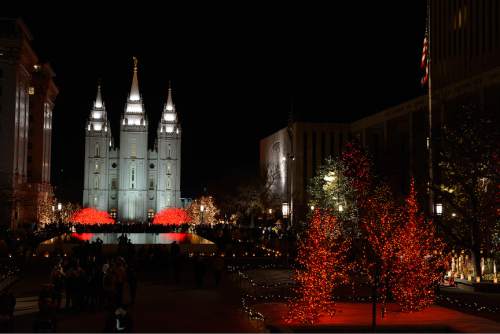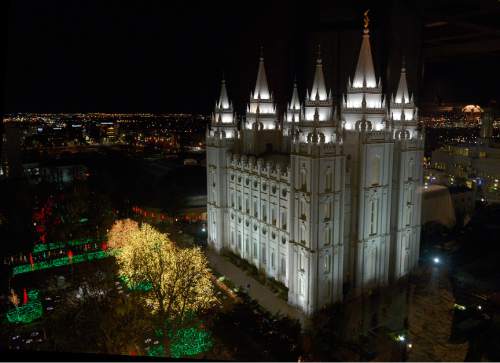This is an archived article that was published on sltrib.com in 2015, and information in the article may be outdated. It is provided only for personal research purposes and may not be reprinted.
A new LDS Church policy toward gay families triggered an avalanche of emotional responses from faithful Mormons trying to understand why children in such unions won't be eligible for a naming blessing, baptism or mission call without the approval of the faith's top leaders.
These changes, approved by the governing First Presidency and confirmed Thursday, are detailed in "Handbook 1," the guide used by lay leaders of The Church of Jesus Christ of Latter-day Saints. Late Friday, the church released a 10-minute interview with Mormon apostle D. Todd Christofferson to explain the policy that has caused such an uproar.
"We don't want the child to have to deal with issues that might arise when the parents feel one way and the expectations of the church are very different," he said, noting that "nothing is lost to them in the end" if these children join the faith when they become adults.
Christofferson said the church made the shift largely as a reaction to the Supreme Court's decision legalizing same-sex marriage nationwide. The faith acknowledges the law but "not as a right that exists in the church. That is the clarification."
Stuart Reid, a former public relations employee of the LDS Church and twice a bishop, believes the policy shifts and the subsequent debate are necessary.
"These are the times when people in the church are confronted with the choice of being politically correct or being prophetically correct," he said Friday. "In other words, they have to choose where they stand and what they are going to support going forward."
Reid, a former Utah lawmaker, has been an outspoken opponent of same-sex marriage and any movement toward the faith's acceptance of these now-legal unions. He supports LDS leaders equating gay marriage with apostasy, an offense triggering disciplinary hearings and possible excommunications, and sees it as a step toward consistency.
"They are treating this," he said, "exactly like they are treating polygamist marriages and the children from polygamist marriages."
Christofferson affirmed this in his video statement, saying there is "a parallel" in the way church leaders view polygamy and same-sex marriage.
The latest LDS handbook also lists polygamy as apostasy, and it places restrictions on the participation of children from such families.
Early Mormons entered plural marriages, but the church abandoned the practice more than a century ago. Participants in polygamy today are branded apostates and are ousted from the faith.
Now, in cases of polygamy and same-sex marriage, people have to be 18 before they can seek approval from the First Presidency to join the LDS Church. To do so, they can no longer live with their parents and must disavow their parents' marriages.
Philip Barlow, professor of Mormon history and culture at Utah State University, said he respects his faith's leaders and believes they didn't intend "a hateful action."
Still, he has reservations.
"I worry for the church that this may cause more hurt than it helps," he said. "The issue has enough potency to further tear at the social fabric of the church over time."
He believes LDS leaders are concerned that if they don't "deepen the boundary" on gay marriage in this way, it will become more accepted among Mormons going forward, a slippery-slope argument bolstered by the nation's rapid acceptance of gay marriage in the past decade.
A Pew Research Center poll released this week shows Mormon acceptance of homosexuality has jumped from 24 percent to 36 percent since eight years ago. And more than a quarter (26 percent) of Latter-day Saints support same-sex marriage.
Barlow recognizes parallels between the faith's handling of gay couples and polygamists, though he said he wouldn't have taken this step.
"There is a certain consistency," he said, "but in real-life application, consistency has to be negotiated with principles of circumstances and love and patience, which are also principles of the gospel that the church espouses."
Barlow had "a heavy heart" when he learned of the policy. He said he previously felt a conflict over being a loyal Mormon and having compassion for friends who are struggling with being LDS and gay or being Mormon and having a gay child.
"This is going to place children, siblings and parents in a position," he said, "where some feel like they are going to have to choose between their family and their church."
Michael Terence Worley, an attorney who has interned at the conservative Marriage Law Foundation, believes the LDS Church is trying to protect children of gay couples.
In a blog post on "A Well-Behaved Mormon Woman," he wrote that the policy "has the effect of not putting children at the center of a conflict between their household and the teachings of their church."
"It allows family autonomy and reduces conflict and secrecy," he argued. "For the prospective member, it helps them not have to lose vital family relationships (and, if they are under 18, food and shelter)."
This argument, also presented by Christofferson, doesn't fly with Jana Riess, a columnist at Religion News Service and a Mormon convert.
She believes there are softer ways to handle any dissonance between a child's home life and religious views, which would be better dealt with by bishops, not a hard-and-fast policy.
She also views the rule as counter to the teachings of the family-centric faith, including that children are not responsible for their parents' transgressions.
"I come from a family where my father had mental illness. There were a lot of problems and issues with my father. One of the most freeing aspects of LDS theology to me is that I'm only responsible for my own sins. I don't have to pay the price for what my father did."
Riess also complained that the new policy is selective and inconsistent because it ignores other types of families.
"It is very, very interesting," she said, "that we don't have anything like this for children who are born out of wedlock in heterosexual relationships."
In a blog item, she also noted the children of murderers can receive a blessing and be baptized.
"I'm really sad about this," she said, because the faith has been making strides toward accepting gay people. "It feels like this is kind of a slam in the other direction."
It also makes her wonder. She knows top Mormon authorities have said members can remain in good standing and support gay marriage, but if people in such unions are apostates, then to what degree do church leaders consider gay allies, like herself, to be apostates, too?
"That is pretty devastating," Riess said.
Christofferson addressed this.
"The church, of course, doesn't attempt to practice mind control and people have varying opinions," he said. "It is only a problem if there is advocacy and people lobby and advocate against the standard and the very clear and expressed position of the church."
The shift has been particularly devastating for Mormon families with gay children.
In a statement, LDS women from the advocacy group Mama Dragons said the "difficult" policy fills them with profound sadness. But the women said they would remain resolute in their support of their children and grandchildren and in their work to keep families from fracturing over the issue of sexuality.
"These statements do not feel like love to us," the Mama Dragons said. "It feels positively medieval, unequivocally wrong and in our estimation stands to push more people out of the church and tear apart families."
The women, who run support groups for Mormon families, said they share the fears of many who believe anti-gay rhetoric from LDS leaders leaves some gay youths contemplating suicide and allows some parents to banish gay children from their homes — although Mormon authorities have denounced such shunning.
"We are collectively heartbroken today as our children get the message loud and clear that they are not wanted here," the group said. "That they are merely collateral damage in some holy moral-values war."
Tribune reporter Jennifer Dobner contributed to this story.





